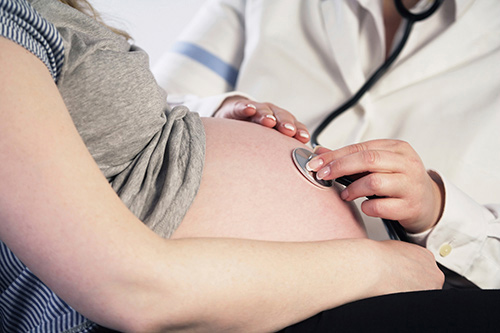
A large-scale genome-wide association (GWAS) scan has found that a low-frequency missense variant in the synaptonemal complex central element protein 2 (SYCE2) gene increases the risk of pregnancy loss by 22%. Notably, this variant is transmitted by the mother. “These results support the hypothesis that some pregnancy losses are due to failures in recombination,” the authors write.
The research was carried out by scientists at deCODE genetics, a subsidiary of Amgen, and their collaborators from Iceland, Denmark, and the U.S. Their work was published today in Nature Structural & Molecular Biology.
Two-thirds of all human conceptions are lost, in most cases before clinical detection. Chromosomal abnormalities are the most common cause of pregnancy loss, and are found in 60% of such cases, but only 0.1% of live births. It’s thus well established that chromosomal abnormalities are a major cause of miscarriages, but the biology behind pregnancy losses, with or without chromosomal errors, is still not well understood.
This study involved over 114 thousand women from Iceland, Denmark, the U.K., U.S., and Finland who have experienced pregnancy loss as well as 565,604 female controls. The team carried out a genome-wide association study that tested 50 million sequence variants.
The team’s discovery that a low-frequency missense variant in the SYCE2 gene increases the risk of pregnancy loss by 22% has several implications.
In a previous report by deCODE scientists, this SYCE2 missense variant was shown to associate with recombination phenotypes in chromosomes that were transmitted from the mother. Recombination between homologous chromosomes is an essential part of meiosis. The product of SYCE2 forms a part of a protein complex that is essential for the alignment of homologous chromosomes for recombination. The missense variant associated with pregnancy loss and recombination is predicted to affect the stability of this protein complex.
A closer inspection of the effect of the variant on recombination revealed an effect on the positioning of crossovers that is proportional to the length of the chromosomes, the longer the chromosome the larger the effect.
The authors propose that this effect may be more extreme in some pregnancies and may contribute to pregnancy loss. The association with pregnancy loss does not account for embryos lost in early gestation before pregnancy has been detected, so the effect of the variant on pregnancy success may be underestimated.
They, “observed a genome-wide significant association of the variant with three recombination phenotypes in maternal transmission, decreased telomere distance, increased GC content and increased replication timing. The variant did not associate with any recombination phenotypes in paternal transmission.”
Further, the authors note, “These results support the hypothesis that some pregnancy losses are due to failures in recombination. They further demonstrate that variants with a substantial effect on the quality of recombination can be maintained in the population.”













